




 |
   |
 |
 |
¿Quién te Cantará? (2003, 41.04) *½/T |
|
| Tómame o Déjame Noche de Copas Incondicional ¿Quién te Cantará? Tengo Todo Excepto a ti Rómpeme, Mátame Acaríciame Culpable o No (Miénteme) |
El Primero, el Único, el Último Enamorada |
|
Current availability:
Chamberlin used:
Edith Márquez began her career as a child star in Mexico City, releasing her first album at the age of fourteen. I couldn't tell you about any of her others, but 2003's ¿Quién te Cantará? is supremely schlocky Latin pop, all big ballads and pounding Spanish-language AOR; would you like extra cheese with that? Y'know, this is almost above criticism; Latin pop for a Latin audience. It does its job and it does it well, it just does it in a truly horrible way. So what were you expecting? Slayer? Hell, I'll give it *½ anyway, just for the beyond-pain listening 'experience'.
Good old Patrick Warren plays Chamberlin, making me think the album was probably at least partly recorded in the States; listen to the country fiddle on Rómpeme, Mátame, bizarrely juxtaposed with the orchestra... Anyway, Warren plays flutes on the title track and Tengo Todo Excepto A Ti and while it could be elsewhere, I'm sure all the album's strings are real. Slushy Mexican balladry, anyone? Thought not.
See: Samples etc.
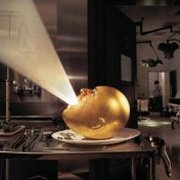 |
De-Loused in the Comatorium (2003, 60.56) ****/TT |
|
| Son et Lumiere Inertiatic ESP Roulette Dares (the Haunt of) Tira Me a las Arañas Drunkship of Lanterns Eriatarka Cicatriz ESP This Apparatus Must Be Unearthed |
Televators Take the Veil Cerpin Taxt |
|
 |
Frances the Mute (2005, 76.57) ****/TT½ |
|
| Cygnus....Vismund Cygnus Sarcophagi Umbilical Syllables Facilis Descenus Averni Con Safo The Widow L'Via l'Viaquez Miranda That Ghost Just Isn't Holy Anymore Vade Mecum Pour Another Icepick |
Pisacis (Phra-Men-Ma) Con Safo Cassandra Geminni Tarantism Plant a Nail in the Navel Stream Faminepulse Multiple Spouse Wounds Sarcophagi |
|
 |
Octahedron (2009, 50.03) ***½/TSince We've Been WrongTeflon Halo of Nembutals With Twilight as My Guide Cotopaxi Desperate Graves Copernicus Luciforms |
Current availability:
Mellotrons used:
The Mars Volta's debut album, De-Loused in the Comatorium, seems to have polarised people; many fans of the band they grew from, 'emo' kings At the Drive in, are appalled at their 'prog pretensions', while those of a slightly more open-minded bent have welcomed it with open arms, pretensions and all. The sound? Something like a hardcore outfit who've just discovered prog, I suppose. The only specific influence I can spot is the mighty King Crimson, particularly on longest track Cicatriz ESP, but this should appeal to anyone into challenging rock; this is absolutely not some cosy prog project, adhering to all the usual clichés. The band aren't afraid to go off at a tangent; in fact, I'd say they revel in it. Oh, if you're still not convinced, both Flea and John Frusciante of The Red Hot Chili Peppers play on the album, Flea playing all the bass parts. Or has that put you off? Anyway, no keyboards credited, but it seems likely that their keys man Isaiah Owens plays the Mellotron (thanks, Filip), with a lengthy polyphonic flute part on Roulette Dares (The Haunt Of) and some half-buried strings on Eriatarka, while Take The Veil Cerpin Taxt has a full-on solo string/flute/cello part in the middle.
Two years on, Frances the Mute has a concept even more impenetrable than their debut, assuming that's possible. It could be just a fraction less eclectic, or maybe it's just that after the shock of that record, they're not going any further out on a limb, but it seems to be ever so slightly less exciting and innovative; too much of a good thing, maybe? Anyway, confusing track markers, Cygnus....Vismund Cygnus' and Miranda That Ghost Just Isn't Holy Anymore's various parts programmed as one track, while Cassandra Geminni's five parts are spread over eight tracks. Huh? Anyway, more Mellotron than before (Owens again?), assuming it's real, alongside the string section employed on some tracks. I was wondering if the strings were all real, until a second listen confirmed that unmistakable 'Mellotron sound'; it sounds like flutes on the third part of Cygnus..., Facilis Descenus Averni, too.
I've had their fifth release, 2009's Octahedron, down as 'sampled' for some time, but an online interview with hand percussionist/keys man Marcel Rodríguez López (younger brother of lead Volta Omar) actually names the band's Mellotron (#863, for what it's worth); I have to say, it sounds pretty real on the record... The album itself is less full-on than their early work, which isn't to say they've slackened off on the intensity front, they're just a little more quietly intense these days, although closer Luciforms' huge build-up to the album's climax gives the lie to that particular theory. Marcel plays Mellotron strings on opener Since We've Been Wrong and Desperate Graves, with a fairly upfront part on the latter.
See: Omar Rodríguez López
 |
The Fragile State of Inbetween (2008, 47.44) ***½/TTT |
|
| Can't Stop the Dreaming Don't Break Your Heart When All's Done All Light Fades Lit By Night I Watched, as You Disappeared Liquorice Kiss |
As I See You There Undone Spoken |
|
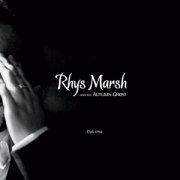 |
Dulcima (2009, 53.02) ***½/TT½In the AfterglowThe Frightened Souls Divide in Silence Nine Times Beautiful The Safety of All You Know You'll Never Fall Surrendered In Dark, in Light |
 |
The Blue Hour (2012, 42.18) ***½/TT½And I WaitRead the Cards The Movements of Our Last Farewell Broken Light Wooden Heart Further From the Truth The Place Where You Lay One More Moment |
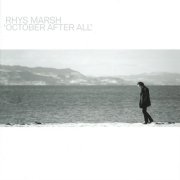 |
October After All (2019, 45.06) ***½/T |
|
| River Long Way Back Golden Lullabies Ride the New Wave The Butterflies Let It Be Known! One Hundred Memories The Summer Days |
'22' (It Will Be) October After All |
|
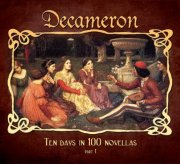 |
Decameron: Ten Days in 100 Novellas, Part 1 (2011) ****/TT[Rhys Marsh contributes]In Deceit They Play |
Current availability:
Mellotrons/Chamberlin used:
Rhys Marsh is a UK ex-pat living in Norway, whose debut, 2008's The Fragile State of Inbetween, is a cross between 'gentle singer-songwriter' and '60s-inspired pop', the brass (admittedly, not exactly full-on Motown) on When All's Done giving an almost Burt Bacharach feel to the proceedings. Most of the album (with the exception of a loud section in Liquorice Kiss) being melancholy, even mournful in places, a strong symphonic element apparent on several tracks. Mattias Olsson (Änglagård/a million others) plays Mellotron strings and choir on Don't Break Your Heart and a major flute part on All Light Fades, while Anekdoten's Niklas Barker adds strings to Lit By Night, vibes and strings to I Watched, As You Disappeared and high cellos, strings, an unidentified woodwind (and viola?) on Undone, making for a most satisfying Mellotronic experience.
The following year's Dulcima is, as Marsh puts it in the sleevenotes, 'not very quiet'. It actually sounds like a folkier Änglagård/Anekdoten hybrid, although I'd be most surprised if he hasn't heard Dead Can Dance and other, more recent darkwave outfits too. Unsurprisingly, the album's at its most 'progressive' on its longest tracks, the vaguely Arabic Nine Times Beautiful, The Safety Of All You Know and epic closer In Dark, In Light, although there's a prog thread running through the whole album, alongside its gothier aspects. Marsh and Olsson play the Mellotron, although Wobbler's Lars Fredrik Frøislie restricts himself to other analogue noisemakers. Anyway, Olsson plays the strings on In The Afterglow and Nine Times Beautiful, plus the flutes on You'll Never Fall, while Marsh adds strings to The Safety Of All You Know and strings and cellos to Surrendered and In Dark, In Light, as far as I can work out. The strings on Divide In Silence don't sound Mellotronic, but the credited violin and cello are only on two other tracks, so I've no idea what they are, I'm afraid.
Stylistically, 2012's The Blue Hour moves towards the 'Burning Shed mainstream', to the point where it's no surprise that Marsh's later work appears on that label. Lengthy, slow, mournful, highlights include the brazen Wooden Heart and closer One More Moment, which is almost to pick out two tracks at random. Marsh plays Mellotron, with something inaudible beneath the real woodwinds and brass on Broken Light and flutes on One More Moment, while Frøislie plays Chamby, with strings on Wooden Heart and strings and cellos on Further From The Truth. Recommended.
After a pair of samplotron/notron releases, 2019's October After All shows a (slightly) more energetic side to Marsh's muse, notably on unusually upbeat opener River and the almost cheerful The Summer Days. However, the album's probably at its best on the more downbeat material, not least the intense Ride The New Wave, The Butterflies and seven-minute closer (It Will Be) October After All. A fault? Too much slightly cheap-sounding string synth layered over several tracks. Needs to be used with more subtlety, frankly. Mellotron on several tracks, if not very much, with distant flutes on Long Way Back, solo strings towards the end of Ride The New Wave and strings on The Butterflies, The Summer Days and (It Will Be) October After All. Incidentally, there's almost an hour of Mellotron-free outtakes available on Marsh's Bandcamp page, dubbed October After All - The Bonus Tracks, consisting of a number of upbeat, mostly drum machine-driven songs bearing little relation to most of his work, which I'm afraid I'll struggle to fully recommend.
See: Samples etc. | Wobbler | Kaukasus
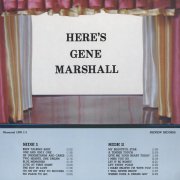 |
Here's Gene Marshall (196?, 37.28) *½/TTT½ |
|
| Keep Talking Baby One and Only One He Understands and Cares Two Hearts One Dream Blue Memories Love at First Sight The Boy in Love I'm on My Way to Success No Place to Go |
My Beautiful Star A Tender Touch Give Me Your Heart Today I Miss You So Let It Be Honey Lift Every Voice I Make Believe I?m With You I Will Never Know Where Does a Dream Go? |
|
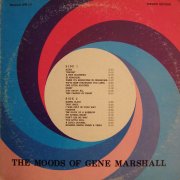 |
The Moods of Gene Marshall (1969?, 41.11) *½/TTT½ |
||
| Blues Tonight A New Beginning In Memorial When it's Springtime in Oklahoma We've Been Strangers Too Long One After Another Bobby |
Just About All This Change of Heart Hiding Place That Smile I Was Only in Your Way Forever The Glow of a Rainbow My Aching Heart |
Don't Ask Me Why You Little Doll A Little Quarrel Holding Hands Under a Table |
|
Current availability:
Chamberlins used:
It seems Gene "Marshall" Merlino is regarded as one of the gods of the song-poem genre, along with the legendary Rodd Keith; if you don't know anything about song-poems, have a quick scout about on the 'Net and despair. Remember those 'have your song recorded by professionals!' ads? Them. On the undated Here's Gene Marshall, his smooth crooner tones deal admirably with the junk he was sent, although the accompaniment is rarely better than perfunctory, the jaunty I'm On My Way To Success (oh no you're not) possibly excepted. The only other not-utterly-appalling effort is the standard country ditty No Place To Go, but I really wouldn't take that as any kind of recommendation. This is so low-budget that no-one bothered to even put a copyright date on it, but it seems it's an early release on the Preview label, so it's probably mid-to-late '60s.
...And the reason this is here? Chamberlin. Lots and lots of Chamberlin. Every bloody track, in fact. Chamberlin strings doubling for real ones wherever you look, bolstering up the sloppy rubbish people wrote back then (he says, naïvely, thinking anything's changed), plus a flute lead opening the album on Keep Talking Baby and male voices on He Understands And Cares. I've no idea who played it and probably never will, but it competently stands in for several expensive musicians in a clear violation of MU rules. So why not a higher T rating? Because after a few tracks, you wish it would stop. Yes, really. It sounds enough like cheesily-arranged real strings that any benefit gained from its tape-replay status is lost due to what it's actually playing.
Due to a serious lack of bio/discographical information on the estimable Mr. Marshall, it's unknown whether or not The Moods of Gene Marshall was his immediate follow-up. My source (hi, Mark) reckons it's probably from 1969, largely due to the especially bad lyrics to Bobby, clearly about Robert F. Kennedy, assassinated in mid-'68. Musically, the album starts off slightly less awfully than its predecessor, but quickly slips into the same slough of despond, sickly-sweet ballads alternating with, well, more sickly-sweet ballads, most of the lyrics concerning the age-old topics of love, love and more love. Once again, Chamby strings on every track; once again, they quickly become unlistenable, due to the universally cheesy arrangements.
Here's Gene Marshall is easily downloadable, should you actually be sick enough to gain any pleasure from this kind of stuff, although its successor is rather harder to find. Yeah, occasionally the lyrics tip over into 'surreal' territory (I Will Never Know), but is that really enough? For some people, the answer appears to be 'yes'. Are wall-to-wall Chamberlin strings enough to make you want to hear these? In which case, you know what to do...
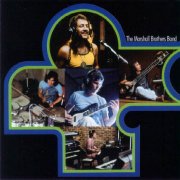 |
The Marshall Brothers Band (1975, 43.25) **½/TTFalcon 1868-1912Bright Light Lady Pioneer Suite Mr 'L' Come Out With Your Hands Up Baby Flying High Summer Love Younger Now |
Current availability:
Mellotron used:
The Marshall Brothers Band are lesser-known Aussie proggers, quite possibly due to their lounge-act name, also quite possibly due to their lounge-act music, certainly when compared to the likes of Aleph or the mighty Sebastian Hardie. The Marshall Brothers Band (produced by noted Mellotronnist Chris Neal) could at best fit into the turn-of-the-'70s UK scene, sounding somewhat out of date in 1975, given that their Aussie contemporaries were actually quite contemporary in comparison. Falcon 1868-1912 is a passable proto-prog piece, but Bright Light Lady is, unsurprisingly, a basic hard rock boogie that no doubt kept 'em happy in the pubs, but can't have sounded that good on record even at the time. Live favourite, no doubt. Pioneer Suite is also pretty dated and by the time we get to Summer Love we're deep into mainstream territory. Closer Younger Now is a bit of an anomaly, being a lengthy Latin workout, sounding almost like an Antipodean Santana, pre-empting Sebastian Hardie's mutation into Windchase by a couple of years, but more, well, lounge.
As you can see, there's Mellotron (from Robert Scott) all over the place here, technically, with an in-yer-face strings intro to Falcon 1868-1912 (and the album), repeating later in the song, plus flutes, with more of the same on Pioneer Suite. However, the only other Mellotron part of any note at all is the strings on Flying High, but saying 'of any note' is stretching things a bit, I'm afraid. The rest of Scott's work consists of background strings of little consequence, heavily overshadowed by his nippy MiniMoog playing on several tracks, so no Mellotron classic here, sadly.
So; an album of some averageness, to be honest, barely worthy of the 'progressive' tag at all across much of its length. I suspect these guys were the proverbial covers band trying to make their mark, but essentially failing due to an inability to distance themselves sufficiently from their day-job, unlike the various aforementioned. Of course, Australia is renowned for its full-tilt boogie madness, but while such Practitioners Of Rock as Rose Tattoo or the mighty AC/DC (Bon version, anyway) had only to get their live set onto vinyl to conquer the world (OK, not the Tatts), any outfit having pretensions to sophistication had better be bloody good and The Marshall Brothers Band weren't. This isn't complete rubbish, but certainly isn't worth splashing out too much for, with only one really decent Mellotron track to its name. Incidentally, although this is on CD, beware: it's on the UK-based Radioactive Records, who are essentially rip-off pirates, so there's absolutely zero chance that any of the band are making an Aussie cent out of this.
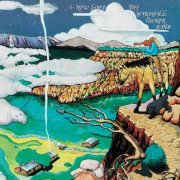 |
A New Life (1973, 41.49) ***/TA New LifeSouthern Woman Blue Ridge Mountain Sky Too Stubborn Another Cruel Love You Ain't Foolin' Me 24 Hours at a Time Fly Eagle Fly |
Current availability:
Mellotron used:
The Marshall Tucker Band (there is no 'Marshall', or 'Tucker') can be loosely described as 'Southern Rock', but if you're expecting anything like Lynyrd Skynyrd, think again; this is more like a jazzier, (even) bluesier, more countryfied version of The Allman Brothers, with little real rock influence, at least going by their second album, 1974's A New Life. Mind you, it covers just about every other style popular at the time, possibly excepting soul; blues (Too Stubborn), sort-of jazz (Southern Woman), rock'n'roll (Another Cruel Love) and plenty of country. But is it any good? It could certainly be worse; the band seem to work best in jamming mode, maybe surprisingly, the title track and Southern Woman being highlights.
Producer Paul Hornsby plays Mellotron, bringing string chords into You Ain't Foolin' Me, most of the way through its near-seven minute length. It's also there, in the background, on 24 Hours At A Time and just possibly on Too Stubborn, but I wouldn't exactly risk my reputation (er, I have one?) on it. Overall, then, a decent enough country rock + album, dipping toes into several other styles and refusing to be pigeonholed. Not much Mellotron, but it's a bonus there's any at all, frankly.
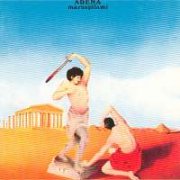 |
Arena (1971, 45.45) ****/TTTPrelude to the ArenaPeace of Rome The Arena Time Shadows Spring |
Current availability:
Mellotron used:
Marsupilami were a proto-prog outfit who, rather like the more successful Nektar, relocated abroad, in this case to the Netherlands. Arena is pretty hard-hitting, actually, nearer to Van der Graaf Generator than Genesis, to be honest, with some sort of ancient Rome concept, at least on side one.
Leary Hasson's keyboard work is excellent throughout, with a fair helping of Mellotron on side one, mostly strings, given that there's a flautist also playing. Best track The Arena also has Mellotron brass parping away at one point, among the general stop-start weirdness going on. A fine album, then, if not exactly symphonic prog. Good Mellotron work too, probably worth it on those grounds alone.
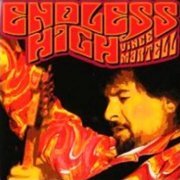 |
Endless High (2000, 47.54) ***/T'Cause I Love YouThe Old Man in the Sky Just a Little All in Love is Fair Ladder of Life Baby, I'm Blue The Court of the Crimson King Yolanda Thoughts |
Current availability:
Mellotron used:
Although I'm unaware of having heard his name before, Vince Martell(ucci, born 1945) was guitarist with Vanilla Fudge, so it shouldn't come as much of a surprise to hear that Endless High is an album of guitar-led, Hammond-driven, mildly commercial hard rock, featuring inventive material such as The Old Man In The Sky and Just A Little. Unfortunately, Martell blots his copybook towards the end by tackling King Crimson's deathless The Court Of The Crimson King, John Garner's inappropriate 'rawk' vocal delivery crushing the song under the (appropriately) grinding wheel of the lyric, followed by a crummy funk/blues workout, Yolanda, to add insult to injury.
Speaking of The Court Of The Crimson King, Scott Treibitz plays what sounds like genuine Mellotron strings on the track, albeit rather more than on the original, adding extra lines to some of the verses. Given that Crimso's Ian McDonald guests on the track, couldn't Martell have found a singer more in, well, tune with the song? Perhaps he likes its Americanisation. I don't. At least the album's first half hour is worth hearing.
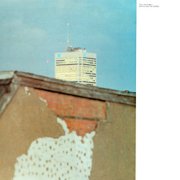 |
This is the Ice Age (1981, 42.01) ***½/T½SwimmingWomen Around the World at Work Casualties of Glass Boy Without Filters Jets Seem Slower in London Skies This is the Ice Age One Day in Paris You Sold the Cottage Three Hundred Years/Chemistry |
Current availability:
Mellotron used:
Martha & the Muffins will always be remembered for the classic Echo Beach, a '60s-influenced noo wave hit with jangly guitars and parping Farfisa, although they've never actually split and, at the time of writing, have a new album due. Of course there was always rather more to them than that single, although I doubt whether they ever matched it for its sheer joie de vivre.
1981's This is the Ice Age was their second post-major success album (their 'star' status lasted for precisely one LP), a far better album than you might expect a semi-washed up pop group to produce. Without sounding like Japan, it inhabits some of the same world as that band's contemporaneous work, flitting between serene soundscapes (the lovely Jets Seem Slower In London Skies), fractured, slightly Talking Heads-ish funk (the title track) and the kind of bouncy pop everyone expected of them (You Sold The Cottage). The album was produced by the up-and-coming Daniel Lanois, brother of band member Jocelyne, which explains the presence of a Mellotron, as he owned a red-painted M400 at the time. He and Mark Gane play it, with flutes on Casualties Of Glass, distant strings on Jets Seem Slower In London Skies, pitchbent ones on the title track and drifting ones on the Three Hundred Years part of closer Three Hundred Years/Chemistry, all to reasonable effect. Supposedly more LanoisTron on their next release, '83's Danseparc, but I can't hear anything, so, without a credit, off it goes. It's a rather less exciting proposition than its predecessor, anyway, being far more of a Japan/Talking Heads steal than anything.
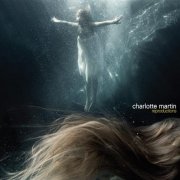 |
Reproductions (2007, 42.25) ***/T |
|
| Angel Obstacle 1 Constant Craving Elderly Woman Behind the Counter in a Small Town Chocolate Bizarre Love Triangle Cherry-Coloured Funk I am Stretched Out on Your Grave |
Urge for Going Just Like Heaven Song to the Siren |
|
Current availability:
Mellotron used:
Third (released) album in seems a bit early for Charlotte Martin to release a covers set; isn't that what washed-up artists do at the end of their careers? Martin clearly isn't washed-up; who says you can't release covers albums whenever you want, anyway? I'm slightly embarrassed to say that I only recognised one of the titles (it would've been two, but I thought Angel was the Hendrix track, not the Massive Attack one), but then, Martin is, musically at least, a whole generation behind my good self, with a totally different set of influences. It's a decent enough effort, vocal pointers being the ubiquitous Kate Bush (Cloudbusting being one of the album's two 'digital bonus tracks') and Tori Amos, while musical ones include The Cocteau Twins (she tackles their Cherry-Coloured Funk here), other covered artists including Joni Mitchell (Urge For Going), Pearl Jam (Elderly Woman Behind The Counter In A Small Town) and the one I spotted, Tim Buckley's Song To The Siren.
Martin and her husband, Ken Andrews, play Mellotron, with flutes and choir on k.d. lang's Constant Craving and probable flutes on New Order's Bizarre Love Triangle, with one or two other vague possibles. If you go for that 'intimate female singer-songwriter' thing (OK, I know she didn't write these ones), you'll probably go a bundle on Charlotte Martin. If not, stay away; you really won't like this. I can't actually compare many of her versions to the originals; suffice to say, she makes them her own, which is more than you can say for most covers albums.
 |
Somewhere in the Middle (1998, 53.46) ***/T |
|
| Fly on a Wall Wink and a Smile Don't Count Me Out Kisses Stain No One Said Goodbye Better Day Somewhere in the Middle That's What I'm Here for |
Somethin' From Nothin' Have I Been Here Before Over My Heart I Love the Way You Love Me |
|
Current availability:
Chamberlin used:
Eric Martin's best-known as vocalist with hair-metallists Mr Big, although, when the band coalesced, he was already a decade into his career, having had some success with 415, renamed The Eric Martin Band. Martin has one of those soulful white-guy voices that can adapt to almost any style, so it's no great surprise to hear that on his third solo album, 1998's Somewhere in the Middle, he tackles a far bluesier set of material than Mr Big would ever have allowed, although most of it's a little overlong and trudges along without any great conviction, sadly.
John Philip Shenale plays Chamberlin, with strings on Kisses Stain and I Love The Way You Love Me, plus solo violin on Somethin' From Nothin', although none of the parts especially enhances its parent track. Somewhere in the Middle is by no means a bad album and should probably be taken as a vocalist's showcase, although the bulk of its material falls rather short, particularly by rock standards. Good at what it does, but not worth it on the Chamby front.
See: Mr Big
 |
Life (2005, 46.05) **/T |
|
| Til I Get to You I Won't Desert You I Don't Care Stop Time Tonight Life I am It's Alright Drop it on Me |
This is Good Save the Dance Que Más Da (I Don't Care) Dejate Llevar (It's Alright) |
|
Current availability:
Mellotron/Chamberlin used:
Sadly for Ricky Martin, his third English-language album, 2005's Life, contains nothing with the joie de vivre of his '99 hit, Livin' La Vida Loca, sounding more like several different producers' experiments in music software programming, making for a record that's undoubtedly technically proficient, but is almost unlistenable to anyone looking for, y'know, a good tune, although This Is Good has a decent stab at it, in fairness.
There seems to be some confusion regarding the album's tape-replay use, so I'll go with the detailed credits listed on Discogs. Patrick Warren plays Chamberlin strings on Stop Time Tonight and inaudible Mellotron and Chamberlin on Save The Dance, which doesn't explain what we're hearing on Drop It On Me, which sounds a lot like Chamby strings. Allmusic tells us that Teddy Mulet also plays Chamby; perhaps it's him? Although it sounds as if there's more Chamberlin, several string parts appear to be the Arabic string section, probably the album's only even vaguely interesting feature. All in all, then, this is one of a tediously increasing number of albums on this site about which you probably have almost zero interest, which makes me wonder why I even bother writing these reviews. All sensible answers on the back of a used Mellotron to the usual address.
 |
 |
The Pillory (1978, 44.15/70.36) ****/TTTTTPart 1Part 2 [CD adds: The Pillory: Live The Pillory: Mellotron Outtakes and Rehearsal] |
Current availability:
Mellotron used:
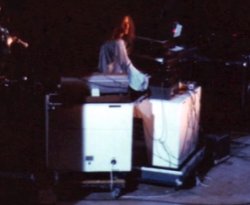 |
Jasun Martz is an American composer/keyboard player who, until 2005, had only ever released this one album, The Pillory, along with a cast of thousands, including Eddie Jobson (Curved Air/Roxy Music/UK) and Ruth Underwood (Frank Zappa). The nearest description I can find for this is 'modern classical'; it's only on the furthest fringes of experimental progressive or electronic music, dissonant voices, strings and brass slipping in and out of the piece. Part 2 is, if anything, even more 'out there', dissonant percussion joining the orchestra in making a right old racket.
You're about twelve minutes into Part 1 before there's any Mellotron at all, at which point it goes completely berserk, with a ten minute Mellotron solo (!) following (real) orchestra and (Mellotron) choirs, incorporating mostly string and flute chords, in one of the most full-on Mellotron pieces I've ever heard. How come this is so obscure? For Mellotron aficionados, this is almost the Holy Grail; unaccompanied mournful M400 strings - absolutely gorgeous. After Part 2's percussive weirdness, there's a lengthy church organ section (real, I think), followed by Mellotron choirs and strings in another unaccompanied piece. This is quite superb; I urge you to try to track down a copy. More than worthy of your time.
In 2004, word started circulating of a follow-up, finally released in 2005 as The Pillory/The Battle. Upon its release, however, it became apparent that the two tracks featuring 'Mellotron' actually contained samples. However, an expanded version of The Pillory has appeared, albeit only 'digitally' (CDs are digital, FFS), adding a ten-minute live version of the piece and fifteen minutes of rehearsals. The former features Martz on two M400s (a B3 and a couple of MiniMoogs are also present), playing Mellotron flute, strings, church organ and choir parts, while the latter's outtakes are exactly what it says on the tin, chiefly Mellotron strings, cellos, flutes and choirs not on the original album.
See: Samples etc. | Sue Reed
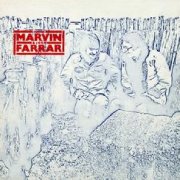 |
Hank Marvin & John Farrar (1973, 40.20) **/½ |
|
| So Hard to Live With Music Makes My Day Skin Deep If I Rewrote Yesterdays Galadriel (Spirit of Starlight) Love oh Love Help Me Onto Your Wagon Small and Lonely Light |
You Never Can Tell Nobody Cares Lord How it's Hurting |
|
Current availability:
Mellotron used:
During The Shadows' initial, early '70s hiatus, Brian "Hank Marvin" Rankin (betcha didn't know that, eh?) and Bruce "Welch" Cripps joined forces with Australian musician John Farrar, making two albums as (wait for it) Marvin, Welch & Farrar. Welch left when the trio didn't 'live up to his expectations', leaving the remaining duo to record 1973's Hank Marvin & John Farrar. Even more than you might expect, the result is at the very blandest end of the era's soft rock schlock, typified by dull opener So Hard To Live With and If I Rewrote Yesterdays, the nearest it gets to 'highlights' being mini-epic Nobody Cares and brief, Beach Boys-esque a capella closer Lord How It's Hurting. Not that near, frankly.
Both gentleman are credited with Mellotron, for some reason, although all I can hear is heavily-reverbed, polyphonic flutes and possible brass (are these from a MkII?) on Nobody Cares, the strings on the horrible Galadriel (Spirit Of Starlight) being real. Seriously, I urge you to give this sorry effort a wide berth. Duller than dull.
See: The Shadows
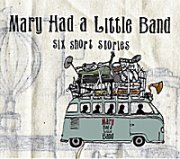 |
Six Short Stories (2010, 22.37) **½/TCar RideTwo-Way Road Gone Don't Even Bother Birds of a Feather Cast-Off |
Current availability:
Mellotron used:
Mary Had a Little Band are (were?) a Dutch indie-end-of-singer-songwriter outfit, led by Marianne Oldenburg. I tried to like this - no, I really did - but its limp material ultimately defeated me. At least it's only twenty-odd minutes long. I've wasted hour-pluses on stuff far worse.
Matthijs Herder plays his M400 on Don't Even Bother, with a pleasant flute part that enhances one of the EP's better tracks. Y'know, the worst stuff to write about is the mediocre; anyone can hate something, but what do you say about a recording that leaves next to no impression?
 |
Marz & Eperjessy [as Marz & Eperjessy] (1971, 30.25) ***/T½An Old Man SaidGive Me More Saying Goodbye This All Makes Me Run To Act Like This (I) To Act Like This (II) Make Me Wanna Stay Thousand Smiles You're Still Good, You're Still Free |
 |
The Dream is Over (1972, 37.24) **½/T |
|
| Slow Train Joe Smack Tracks And Now I Know The Dream is Over Who Turned the Light on Wheels Are Turning Slippin' and Slidin' |
Lord Have Mercy Sayin' Things |
|
Current availability:
Mellotrons used:
German guitarist Rainer Marz (1945-2016) had a long and distinguished career (Geronimo, Wyoming, Midnight Circus, Atlantis, a million sessions), but only ever released two albums under his own name. The first, Marz & Eperjessy (as, er, Marz & Eperjessy) was a collaboration with the otherwise-obscure Juraj "George Eperjessy" Eperješi and would probably be categorised as 'acid folk' these days, a largely acoustic record with psychedelic guitar interjections. Frankly, this is not a style that's dated well, the duo's harmonising being 'charmingly' off and most of the material being (to be brutally honest) rather dull, at its best on Thousand Smiles, Marz channelling Neil Young's then-recent guitar work on Everybody Knows This is Nowhere. Marz plays Mellotron, with a high string line on opener An Old Man Said, following the flutes, a high, screechy string line towards the end of To Act Like This (II) and more of those high strings and a poorly-played, upfront flute solo on closer You're Still Good, You're Still Free.
1972's The Dream is Over ditches Eperjessy and changes style, but, I'm afraid to say, it's a long way from anything you might consider 'progressive', being largely dullsville, mainstream hard-ish rock (with the accent on the '-ish'). The lengthyish Lord Have Mercy is easily the best thing here, as in, 'would pass muster on a better album', but I wouldn't take that as too much of a recommendation. Marz on Mellotron again, although the only obvious use is the strings on Joe, making for a fairly unsatisfying listen both musically and Mellotronically. Even though this has finally gained a CD release, I'd have trouble asking anyone to buy this. So I shan't.
 |
La Maschera di Cera (2002, 42.11) ****/TTTT |
|
| La Maschera di Cera Il Tuo Volto La Tua Gente Il Tuo Rifugio La Tua Irrealtà La Tua Guida La Mia Fine... Del Mio Mondo Che Crolla |
Del Mio Abisso e del Vuoto Il Vuoto L'Abisso E Senza Più Peso Io Salgo Del Mio Volo |
|
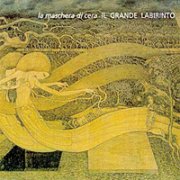 |
Il Grande Labirinto (2003, 65.34) ****/TTTTIl Viaggio Nell'Oceano Capovolto (parte 1)Il Grande Labirinto Il Canto Dell'Inverno Ai Confini del Mondo Il Viaggio Nell'Oceano Capovolto (parte 2) La Consunzione |
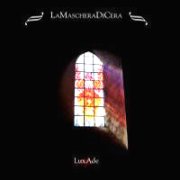 |
LuxAde (2006, 62.25) ****/TTTT |
|
| Porta del Cielo Doppia Immagine Un Senso All'impossible Teatro di Follia Il Ricordo Orpheus Nuova Luce Passato Sogno Presente Realtà |
Enciclica 1168 O Scena I: Preludio (Gennaio 17) O Scena II: Caduta/Visione O Scena III: Delitto O Scena IV: Coscienza O Scena V: Canto Pagano/Metamorfosi O Scena VI: Dopo la Pioggia O Scena VII: Sterminio O Scena VIII: Lumen in Coelo O Scena IX: Postludio ("Così in Alto è Come in Basso") Schema (v.s.d.) |
|
 |
Petali di Fuoco (2010, 56.46) ****/TTT½ |
|
| Fino All'Aurora D-Sigma 4.18 Discesa Tra Due Petali di Fuoco L'inganno Agli Uomini Che Sanno Già Volare Il Declino |
Phoenix La Notte Trasparente |
|
Current availability:
Mellotrons used:
La Maschera di Cera (the Mask of Wax) are a new Italian band who, praise be, act as if the whole '80s neo-prog scene had never happened, playing symphonic progressive rock as she should be (assuming, that is, that you consider the '70s scene to be the genre's peak). This isn't especially surprising, when you consider that the band was put together by Finisterre men Fabio Zuffanti and Agostino Macor, making them another of that outfit's side-projects, along with the excellent Hostsonaten. Their self-titled debut is an 'album-length' album, with four lengthy tracks, utilising all the compositional tricks you could wish for from a band hailing from that country, not to mention a raft of analogue keys. I know La Maschera di Cera will grow on me with repeated plays, given that it's caught my ear on a first hearing; there are so many also-rans out there that it's a joy to hear a band who know how to write for the genre, not just sticking bits together randomly, like a few I've heard recently (tip: avoid American outfit Akacia). Macor's Mellotron work on the album is quite exemplary, the first sound you hear being a Mellotron flute part on La Maschera Di Cera itself (originally written in 1991, apparently). After that it's mainly strings across the board, although, with no timings for the individual parts on the relevant tracks, I've no way of knowing which ones have any Mellotronic input. Suffice to say, if your listening remit involves a) complex, melodic progressive rock and b) loads of Mellotron, you won't be even slightly disappointed.
Il Grande Labirinto, like all good sophomore efforts, develops the band's style, while remaining true to their original intentions. There's a little more dissonance on display here, while they experiment with backwards tapes in a few places, although it's very recognisably the same band. I still can't decide whether or not the longer running time was a good idea; OK, more music, but a long CD can become fatiguing to the ears, especially when it's a 'difficult' listen. And is the quality maintained over the extra length? In this case, despite the album appearing only a year after their debut, it would seem so, which makes a refreshing change. Anyway, Macor really comes into his own on a couple of tracks, with fantastic piano work on the brief Il Canto Dell'Inverno, although, on reflection, I think the oboes on the track (and on Il Viaggio Nell'Oceano Capovolto (Parte 2)) are probably real. On top of the standard strings and flutes, there's Mellotron choir to be heard, too, possibly the album's best Mellotron work being on the aforementioned lengthy Il Viaggio Nell'Oceano Capovolto (Parte 2), also possibly the album's best piece. All in all, another Mellotron classic, I think.
2006's LuxAde carries on in similar fashion, featuring a twenty-five-minute concept piece, Enciclica 1168, that does everything you'd expect and want of such a thing. The rest of the album doesn't disappoint, either, although there are places where you hope for something transcendent to happen, only to hear the track peter out rather than lift the listener to a new level. Macor is credited with 'keyboards' and Zuffanti with 'choirs', so who plays what is hard to say, although the only two Mellotron sounds on the albums are strings and choir. Plenty of both, although I haven't attempted to ascertain exactly which parts of the epic are more Mellotronically inclined. Yet another great album; why can't more modern bands be like this?
After a four-year wait, 2010's Petali di Fuoco is worth the delay; a superb effort, this time eschewing epics for shorter, yet no less progressive pieces. As with many similar albums, where the 'song' is probably less important than the 'piece', picking out highlights is almost irrelevant; the overall quality of the material is extremely high, the only slight dip being closer La Notte Trasparente, which slips into an almost neo-prog routine, a lengthy guitar solo meandering over a repeating keyboard pattern, of the kind you hoped had slipped out of use due to overexposure. Macor adds Mellotron strings and choir to all but one track, brief acoustic guitar interlude 4.18 (a lie: it's only 1.37), adding subtlety to his palette and refusing to overdo it anywhere.
See: Samples etc. | Finisterre | Hostsonaten | Fabio Zuffanti | Fabio Zuffanti & Victoria Heward